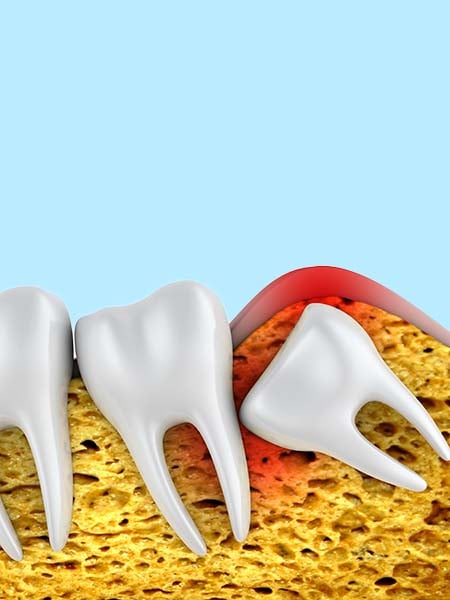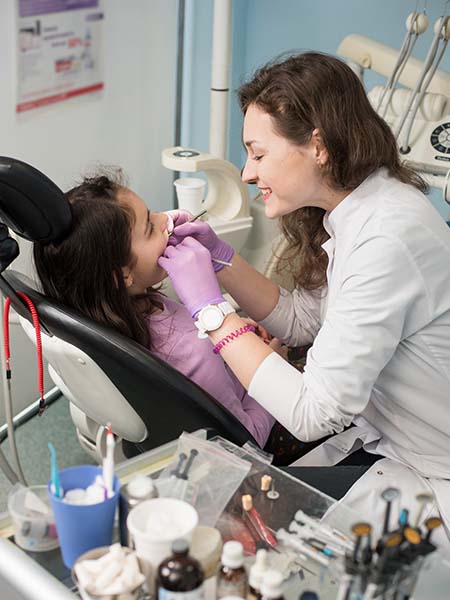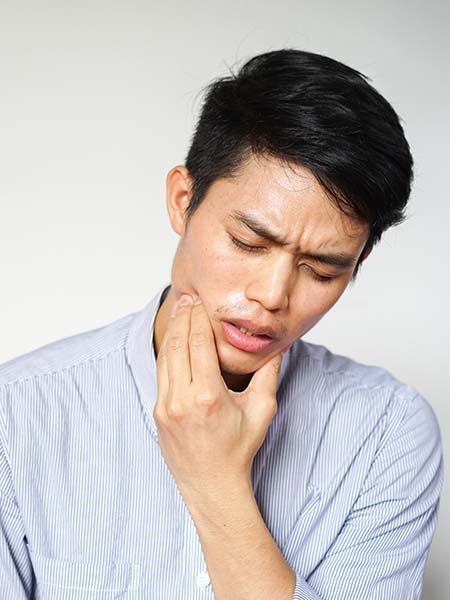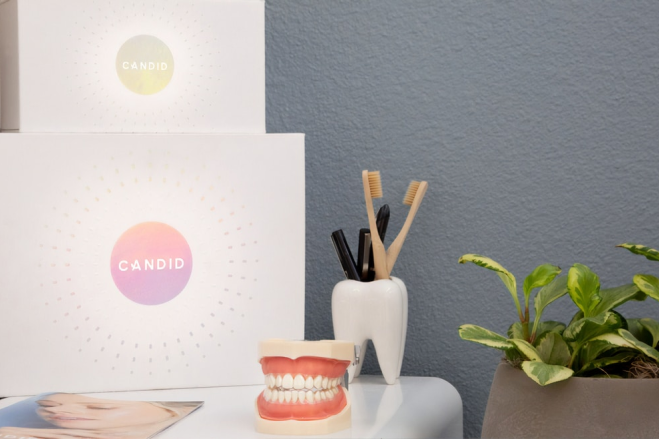.svg)
.svg)
.svg)
.svg)

Wisdom Tooth Extraction in 2026: Overview and General Information
At Nuffield Dental, impacted wisdom teeth may be assessed for removal based on clinical findings. An impacted wisdom tooth is when the tooth has not enough room to come out like it should. Wisdom tooth extraction in Singapore is done under a local anaesthesia.
What are Wisdom teeth?
Your wisdom teeth, sometimes also called your third molars, are the very last teeth at the back of your mouth. They usually come in much later than any of your other teeth—when you are older, between ages 18 to 24 years. Most adults have a total of 4 wisdom teeth in total, with two at the top and two at the bottom.
What is Wisdom Tooth Extraction?

What is Wisdom Tooth Extraction?
Sometimes wisdom teeth erupt in a way that affects your other teeth or gums, or if there is no space for them to come out, they get trapped within your jaw causing oral problems.
If they are in a position that is difficult to reach when brushing, chances are food particles get trapped here. This causes plaque and bacteria build-up, resulting in decay.
In some cases, dentists may discuss removal as an option after clinical assessment.
Do I Need Wisdom Tooth Extraction In Singapore?
- Red or swollen gums or bleeding gums. One of the first signs of your wisdom teeth coming in is when you experience any tenderness or discomfort around the back of your mouth. This can be on either side or just one. If you can imagine the sensation of adult teething, this would be an You may also notice swollen gums.
- Swelling around the jaw. As your wisdom teeth come in, they can push against your other teeth and make them move. This in turn can cause discomfort in your jaw, so it feels stiff, sore and difficult to open. This can also cause swelling of both the gum in the back of the mouth or on the side of the jaw.
- Bad breath. If your wisdom teeth are impacted and cannot come in cleanly, they can trap food and bacteria, irritate your gums, and injure other teeth. All of these things can contribute to the type of bacterial infection that can cause bad breath.
- An unpleasant taste in your mouth. If you get an infection or tooth decay in your wisdom teeth, they can cause a persistent bad taste. Again, prevention is better than cure. Removal may be considered depending on the cause identified during assessment.
- Difficulty opening your mouth. Misalignment due to your wisdom teeth can also make it difficult to open and close your mouth.
Do I Need Wisdom Tooth Extraction In Singapore?

Potential Considerations for Wisdom Tooth Removal
- Tooth Decay
As your wisdom teeth are so far back in your mouth, they are often difficult to keep clean, accumulating plaque and food particles. If this occurs for a prolonged period, both your wisdom tooth and surrounding teeth can start decaying.
This is especially unfortunate as it may affect adjacent teeth if not managed appropriately. In some cases, early removal may be considered to reduce the risk of tooth decay or related complications, depending on clinical assessment.
The gums surrounding your wisdom teeth may also become inflamed due to the same reason of prolonged plaque and food particle accumulation. This is especially the case in improperly-erupted wisdom teeth.
As a result, pain, bad breath, and swelling can follow. In severe cases, this can be accompanied by gum diseases like gingivitis and periodontitis. These conditions should be assessed by a dental professional.
- Teeth Crowding
If your wisdom teeth erupt in a misaligned manner, they can push the rest of your other teeth in front into disarray. This causes them to be malpositioned, which can negatively impact your appearance, bite, speech and oral hygiene.
For patients who have invested in orthodontics treatment, the work done can be reversed, causing teeth to shift or crowd again.
In a minority of cases, cysts or tumours can form around an impacted wisdom tooth. If these are left to fester, they can destroy your surrounding jaw bone and infect neighbouring teeth, which may require further dental management.
Potential Considerations for Wisdom Tooth Removal

.svg)
.svg)
.svg)
.svg)

Cost Of Wisdom Tooth Extraction In Singapore
The costs of wisdom tooth surgery vary primarily due to how complex the case is. This is dependant on factors such as:
- Age: Younger patients have softer bone, which makes wisdom tooth extraction easier.
- Position of gum tissue: A wisdom tooth is easier to extract if it has fully emerged, compared to if it was underneath your gum tissue.
- Submerged level of wisdom tooth: If your wisdom tooth is completely buried within the bone, this will require drilling into your jaw to extract.
- Proximity to nerves: Deeply buried wisdom teeth are closer to nerves, which makes extraction difficult.
- Root shape of wisdom tooth: A wisdom tooth with an irregular root shape is harder to extract.
Medisave claims may be available, subject to eligibility and assessment. Our doctors will need to examine your dental issue to advise you accordingly with the actual cost for your dental needs.
Possible Outcomes Following Wisdom Tooth Removal
- Oral and Facial Pain Prevention or Relief. Another problem people face when keeping their wisdom teeth is orofacial pain. This pain in your mouth and face come from problems related to your wisdom teeth, such as tooth crowding, gum disease, and tooth decay.
-
Reduced Risk of Oral Disease. Keeping your wisdom teeth means you suffer higher risk for tooth decay and gum disease. These common problems lead to advanced oral infections and discomfort. You also face loss of vital tissues from these conditions, such as through bone loss and gum recession. Risk varies between individuals and depends on multiple factors.
-
Fewer Oral Injuries. Wisdom teeth commonly come through at an angle. Wisdom teeth that are turned outwards can lead to you accidentally biting your cheeks while chewing, while teeth that point inwards can scratch the sides of the tongue.
-
Cleaner Teeth. Many people struggle to clean their wisdom teeth thoroughly. When teeth are solely partially erupted, it can be impossible to brush the entire tooth surface to prevent the build-up of dental plaque and tartar. If your wisdom teeth and molars are very tightly packed together, you might also find it difficult to slide floss between the teeth.
Over the years, the inability to clean teeth thoroughly can lead to dental decay. Oral hygiene considerations may be discussed by the dentist.
Wisdom Tooth Extraction Procedure
Stage 1: Consultation
- Exploration of Concerns
When you attend your wisdom tooth removal consultation, our team of providers will discuss all of your individual concerns, taking your health, dental and financial circumstances into account.
- Full Dental Assessment
Your general health condition, as well as the condition of your wisdom teeth and gums, will be thoroughly assessed, which may include having to take some necessary X-rays or CBCT scans, to determine the exact position of your wisdom teeth and their surrounding structures.
- Individualised Treatment Plan
Our providers will then thoroughly explain the benefits and risks of removal of wisdom teeth, the procedure involved, and tailor a plan that is specific to you, to explain the procedure and considerations.
Stage 2: Wisdom Tooth Removal Procedure
- Local or General Anaesthesia
Before your wisdom tooth is removed, the relevant area will be entirely numbed with general or local anesthesia. Discomfort is minimised through appropriate anaesthesia.
You may additionally be placed under prior sedation or general anaesthesia depending on your agreed individualised treatment plan. - Wisdom Tooth Removal
A minor surgical procedure may be involved depending on the position of your wisdom tooth and surrounding bone, in which case a small area of your overlying gum will be lifted to gain access to your wisdom tooth.
Your tooth may then need to be sectioned for its removal. You may feel some pressure and vibrations and hear some cracking noises. Pain perception varies between individuals.
Once the tooth is removed, the area will be well sterilised, and your gums will be stitched back together.
Stage 3: Post-Operative Care
After the procedure is completed, recovery time varies depending on the individual and procedure complexity.
- Some minor bleeding from the wound can be expected. This can be controlled by biting down firmly on a piece of gauze.
- Facial swelling and discolouration of the overlying skin may also develop, swelling may occur and varies between individuals. You also may not be able to open your mouth as large as usual for a few days. You can use ice packs on your face to reduce the swelling.
- Painkillers, antibiotics, and an antiseptic mouthwash may be prescribed if clinically indicated to prevent any post-operative complications.
- You should maintain good oral hygiene and brush and floss, avoid vigorous rinsing, eat soft foods, avoid smoking, avoid alcohol and avoid strenuous activities for at least a few days after the procedure to minimise the risk of any complications.
Risks Of Wisdom Tooth Extraction
- Due to the nature of the procedure, there may be facial swelling, discolouration of the overlying skin, pain, and jaw stiffness, so there may be a need to take time off from work or school. The symptoms are usually worse for the first three days and will gradually enhance.
- During the surgery, there is a small risk of accidental damage to your adjacent teeth and jaw. While uncommon, risks will be discussed prior to the procedure.
- In some cases, after the procedure, the area may become infected or inflamed. The risk of this can be significantly reduced with strict adherence to the post-operative care instructions we provide.
- There may be a possible risk of temporary or permanent altered sensations to your lower lip, cheek, or tongue from the removal of lower wisdom teeth. This risk varies according to the proximity of your wisdom tooth to your nerves. Your dentist will discuss this thoroughly with you during your initial consultation, with the help of an X-ray or Cone Beam Computed Tomography (CBCT) scan.
Risks Of Wisdom Tooth Extraction

Wisdom Tooth Extraction FAQs
- How long does a Wisdom Tooth removal process take?
A non-surgical wisdom tooth extraction typically take about 30 minutes to complete per tooth.
Wisdom tooth surgeries however, will take between 30 mins – 60 mins per tooth but this is dependable on the complexity of the surgery.
- Is the Wisdom Tooth Surgery painful?
You shouldn't feel any pain as your wisdom teeth are removed because the area will be numb. However, if you do feel pain during the procedure, tell your dentist or oral surgeon so they can give you anaesthetic. -
How many days of rest are usually recommended after a wisdom tooth surgery?
Recovery recommendations vary depending on the complexity of the procedure and the individual’s healing response. Your dentist will advise you on appropriate post‑procedure rest during your consultation based on clinical assessment.
-
How long will post surgery pain last?
Post-operative discomfort varies. Pain medicine will prescribed to all patients after the surgery.
- What to expect when getting wisdom teeth removed?
Normal healing after tooth extraction should be as follows: healing progression differs between individuals. - What are some of the side effects of wisdom tooth removal?
1. Dry Socket (Alveolar Osteitis)
After the wisdom teeth removal, blood clots form over the extraction sites to help your mouth heal. Alveolar osteitis, or dry socket, occurs if this blood clot is dislodged, leaving the nerve under your gum exposed to air or food debris. Signs include throbbing or sharp pain at the extraction site. Contact the clinic if symptoms occur.
2. Lip Numbness
Lip numbness is rare, but it's possible. Your wisdom teeth are close to the inferior alveolar nerve in the jaw. If the nerve becomes damaged during the procedure, it can lead to numbness in the lips or jaw. This numbness is usually temporary, but it can be permanent if nerve damage is severe. Most wisdom teeth extractions do not have this complication, however.
Your dentist or surgeon will discuss with you possible wisdom teeth extraction complications and their recommendations for reducing risk, including taking care of your extraction site after the procedure to ensure proper healing. Follow their aftercare instructions and contact their office if you are concerned about a side effect or complication of your wisdom teeth removal.

Our Team
View MoreAt Nuffield Dental clinic, your dental needs are cared for by our dedicated team of dentists.

Dr Samintharaj Kumar S/O Samy Raja
Specialisation
Wisdom Tooth Surgery
Training
BDS (Singapore)
The Nuffield Dental Clinic Network In Singapore
Seletar Dental
Nuffield Dental Seletar
Greenwich V
1 Seletar Road #01-07/08
Singapore 807011

Kovan Dental
Nuffield Dental Kovan
Simon Plaza
2 Kovan Road #01-03
Singapore 548008

Serangoon Dental
Nuffield Dental Serangoon Gardens
Serangoon Garden Estate
57 Serangoon Garden Way
Singapore 555953

Siglap Dental
Nuffield Dental Siglap
The Domain
914 East Coast Road #01-03
Singapore 459108

Bedok Dental
Nuffield Dental Simpang Bedok
East Village
430 Upper Changi Road #01-64
Singapore 487048

Holland Village Dental
Nuffield Dental Holland Village
7 Holland Village Way #03-16
Singapore 275748

Jurong East Dental
Nuffield Dental Westgate
Westgate
3 Gateway Dr #04-32
Singapore 608532

HarbourFront Dental
Nuffield Dental HarbourFront
HarbourFront Centre
1 Maritime Square #02-64A
Singapore 099253

Orchard Dental
Nuffield Dental Jewel
Wheelock Place
501 Orchard Road #05-01
Singapore 238880

Raffles Place Dental
Nuffield Dental Raffles Place
One Raffles Place
1 Raffles Place #05-19
Singapore 048616


Book an Appointment
Fill out the form for any request or questions you have and we will contact you within one working day..

Why Choose Nuffield Dental?
Nuffield Dental is a multi-disciplinary dental care centre in Singapore providing a range of general and surgical dental services.
Our team offers dental care across multiple treatment areas, including wisdom tooth procedures and oral surgery. We aim to ensure that patients are well-informed and supported throughout their treatment journey.

Our dentists include providers who are registered with the Singapore Dental Council and have experience in oral surgery and dental implant procedures.
Articles
The newest and best lifestyle articles selected by our editorial team.

- 11 Feb 2026
- 2 mins read
- Dental Fillings
Why the Global Phase-Down Is Happening Mercury is listed by the WHO as one of the top ten chemicals of public health concern. In dentistry, the...

- 17 Nov 2025
- 2 mins read
Current scientific evidence does not show a conclusive connection between intact dental amalgam fillings and symptoms such as brain fog, chronic...

- 17 Nov 2025
- 2 mins read
The Minamata Convention on Mercury established 2034 as the global target year to end the use of dental amalgam. While this may seem gradual, the...
.png?width=2223&height=447&name=Background%20(4).png)







.png)

.png)


